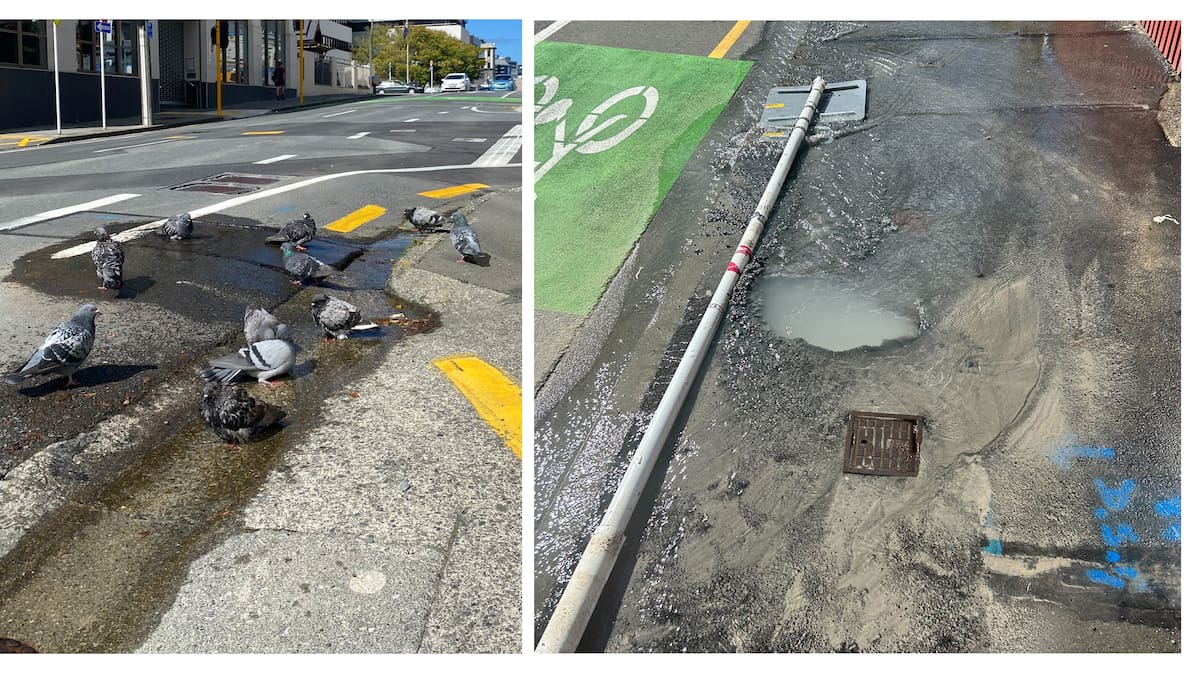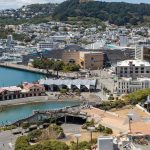The threat of Wellington running out of water this summer is officially over, despite 44 per cent of the region’s drinking water being lost through leaks.
This morning, a water leak in Aro Valley became so bad that it caused a small sinkhole and started spraying cars as they tried to pass. Wellington Water treated the leak with urgent priority and it was fixed within hours.
Meanwhile, on the other side of town pigeons were spotted bathing in water seeping out of another leak on Molesworth St.
Wellingtonians would be forgiven for thinking it is nothing short of a miracle water restrictions only reached the point that outdoor residential sprinkler and irrigation systems were banned this summer.
Last year, Wellington Water started warning of a looming water shortage that could result in parts of the region running dry.
Authorities had planned for a regional state of emergency and enquired about whether more water could be drawn from Hutt River to prevent the worst from unfolding.
It prompted some residents to queue for hours to get their hands on emergency water tanks. Hutt City Council reported it sold out of tanks in a matter of hours one Friday.
Wellington Water’s latest risk analysis shows there is now just a 16 per cent chance of moving to Level 3 restrictions, which would result in all outdoor residential water use being banned.
This has reduced from the 76 per cent chance forecast in mid-January.
There is now just a 5 per cent chance of moving to Level 4 restrictions- down from 33 per cent.
Wellington Water thanks residents for doing their bit to conserve water.
“By keeping a close eye on your water use, we have held off Level 3. We’re close to the end of the risk period, and cooler weather is on the way.
“This has reduced the chance of tighter water restrictions. Factors like low river levels mean it’s not time to move to Level 1 just yet, but continuing to follow Level 2 restrictions will help us get there sooner.”
Councils propose large rates hikes to plug leaks
Meanwhile, large rates increases are being proposed to try and get on top of leaks and ageing infrastructure.
Wellington City Council is proposing a 16.4 per cent rates increase that does not include the levy for a new sludge facility that will add a further 1.6 per cent.
This means the rates increase will effectively be 18 per cent for the coming year.

Mayor Tory Whanau plans to spend $1.8 billion on three waters over the next ten years.
“Our proposed Long-term Plan for the next 10 years includes record investment in water and our city”, she has said.
“One in every four dollars we spend on capital will go on three waters.”
Hutt City Council plans to spend $1.5 billion on water over the same period and has forecast a 16.9 per cent rates increase for the coming year.
Mayor Campbell Barry gained support from councillors to include an extra $2.8 million in the draft budget to get on top of a backlog of leaks and mitigate the risk of a severe water shortage next summer.
“The situation this summer is not sustainable year on year. While pipe renewals are the only long-term fix in stopping leaks, we need to be doing everything we can to avoid an acute water shortage in the short term,” Barry said.
“We are declaring a crackdown on leaks in Lower Hutt.”
What the new Government means for water services
Councils across the region are also voting on whether to join forces on a plan to reform broken water services.
The Government’s new Local Water Done Well policy is still under development. Still, there are indications councils will be required to develop a water service delivery plan that meets regulatory and investment requirements by mid-2025.
A memorandum of understanding will create a non-binding partnership between councils.
Under this agreement, one elected member from each council will sit on an advisory oversight group alongside iwi representatives.
This group would be chaired by an independent expert and supported by council chief executives.
Georgina Campbell is a Wellington-based reporter who has a particular interest in local government, transport, and seismic issues. She joined the Herald in 2019 after working as a broadcast journalist.




 Wellington jolted by 4.6 magnitude earthquake
Wellington jolted by 4.6 magnitude earthquake